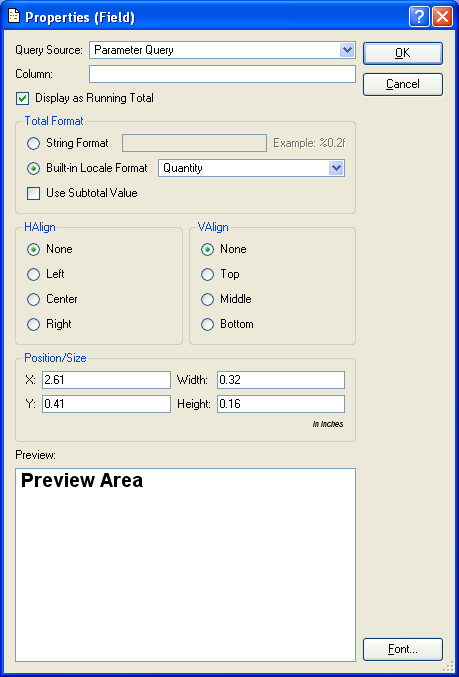
|
OpenRPT Product Guide |

'Insert Field' Icon
The icon enables you to create new field objects. Field objects are used for pulling dynamically generated data into a report from the database the report writer is connected to. For example, a field object may be used to include running totals in a report. By definition, field objects are designed to handle a single line of data. For multiple lines of data, use a text area object.
To create a new field object, first select the icon. Then click in the section of the report definition where you want the field to be located. Doing so will create the field object in that section.
For more information on using field objects in report definitions, see the Getting Started chapter.
Once the field object has been created, you may then define the field object's properties. To define a field object's properties, double-click on the field object. The following screen will appear:

By definition, field objects are designed to handle a single line of data. For multiple lines of data, use a text area object.
When defining the properties of a field object, you are presented with the following options:
Select a query source from the drop-down menu by clicking on the arrow to the right of the field. Query sources are used to populate report definition objects with dynamic data from the database the report writer is connected to.
Specify the name of the database column you want to use from the selected query source. A query source may refer to multiple columns in its SELECT statement. By indicating a specific column, you instruct the query source to return data only for that specified column. Other columns appearing in the SELECT statement will be ignored.
For more information on query sources and the link between database fields and report definition objects, please see the Getting Started chapter.
Select if you want the data retrieved from the database to be displayed as a running total. No running total will be used if this option is not selected.
When running totals are calculated for columns designated as Boolean, the "true" values are assigned a value of "1", while "false" values are assigned a value of "0".
If the Display as Running Total option is selected, specify one of the following formatting options:
Enter a string format to use when formatting the total.
Select this option and then choose one of the available options from the drop-down menu by clicking on the arrow to the right of the field. Built-in locale formats may only be available in some installations.
Select if the running total represents a subtotal.
Specify how you want text to be aligned horizontally within the field object:
Select if you do not want to specify a horizontal alignment.
Select to align text on the left margin.
Select to align text in the center.
Select to align text on the right margin.
Specify how you want text to be aligned vertically within the field object:
Select if you do not want to specify a vertical alignment.
Select to align text on the top margin.
Select to align text in the middle.
Select to align text on the bottom margin.
Specify how you want the field object to be positioned and sized within the section where it is located.
Specify the distance, measured in inches, from the section’s left border to the upper-left-hand corner of the field object.
Specify the width of the field object, measured in inches.
Specify the distance, measured in inches, from the section’s top border to the upper-left-hand corner of the field object.
Specify the height of the field object, measured in inches.
The position and size of a field object may be modified manually when editing a report definition.
Displays a preview of the field, using the specified font. Selecting the button will bring up the Select Font screen, where you may specify font name, font style, font size, and font effects.
To the far right of the screen, the following buttons are available:
Select to save your settings.
Closes the screen without saving any changes, returning you to the Application desktop.